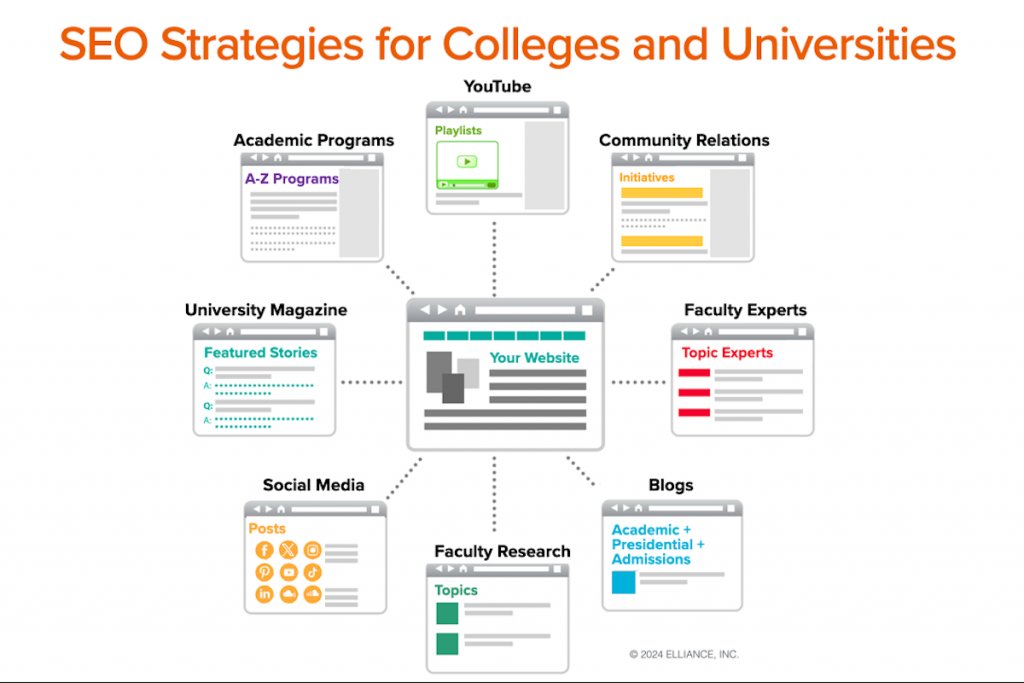| Dec 30, 2023
SEO Strategies for Growing Enrollment at Colleges, Universities and Higher Education Institutions

In the past 30 years, Elliance has deployed SEO strategies for more than 100 colleges, universities and higher education institutions in service of growing their enrollment, endowment and reputation.
Why have we insisted on recommending SEO to our higher education marketing clients? For two reasons.
First, because Google/Bing page 1 is destiny. Trusted page one organic rankings and high visibility for your social media content equate to owning the world’s hottest real estate. 90% of users never go beyond page 1 of search results. Organic rankings (i.e. the top 10 natural search results) are clicked 9-folds more, trusted more, and convert three-folds better than paid ads.
Second, being found on page 1 is the best means for finding, getting, keeping and growing right-fit students, faculty, and staff as well as nurturing relationships with alumni, foundations corporate partners and media.
We recommend our clients begin the SEO journey by crafting an intentional plan powered by a Keyword Lexicon that contains clusters of keywords and phrases spanning academic programs, brand ideals, and areas of thought leadership, innovation and intellectual capital. Categories in the lexicon include academic program keywords, brand positioning keywords, reputation keywords, decisioning keywords, and location keywords.
Here are the nine effective strategies:
1. Academic Programs SEO Optimization
We have not found a more dependable and reliable way to ensure predictable enrollment growth than securing Google page one rankings for a college’s academic programs. Give priority to signature programs and program portfolios.
2. University Magazine SEO Optimization
A PDF, ISSUU or flipbook version of an alumni magazine is not a digital magazine. They are walled gardens that prevent the Google bot from crawling, indexing and ranking each story. True digital magazines are an interactive hub where each individual story can be read, interacted with, optimized for Google rankings, promoted and shared. Read more about the benefits of digital university magazines.
3. Faculty Experts SEO Optimization
Optimize all faculty profiles, and their areas of research to secure Google/Bing page one rankings. Prioritize rock star faculty if you have to pick and choose due to resource constraints. Writers and reporters in the media are always looking for subject matter experts on search engines. Let them find your thought leaders.
4. Faculty Research SEO Optimization
Optimize all institutional areas of research, and individual research projects and papers to secure Google/Bing page one rankings. Prioritize your stalwarts if you have to pick and choose due to resource constraints. Peers, corporations, foundations and government agencies are always looking for subject matter expertise on search engines. Let them discover your thought leadership.
5. Academic, Presidential and Admissions Blog SEO Optimization
Institutions should decide which type of blog would serve them best: presidential blogs, thought leadership blogs, advice blogs, academic blog or admissions blogs. Launch the right type of blogs for your institution.
Create a readership that engages with your passion for delivering thought leadership, practical, valuable and advice-oriented content related to your academic programs and fields of study. Each blog post should be conceived to win a specific keyword or phrase.
Tell stories. Leverage news-jacking when appropriate. Act as a thought leader. Educate prospective students, alumni, corporations and community organizations. Quote other authoritative peers and partner brands who’ll lend your institution credibility. Write blog posts with commensurate fidelity, which is less than that of an academic program page or a news item. Tie it back to your academic programs, research labs and centers of excellence. Build topic authority by creating a series of small blog posts instead of packing everything into one long one. Make your posts sharable and share the blog post on your social channels.
6. Social Media SEO Optimization
Optimize all your social channels to secure Google/Bing page one rankings. Make them beautiful. Engage visitors. Think of your social posts as invitations to explore deeper stories. Because search engine bots ranking algorithms take social media into consideration, infuse keywords from your Keyword Lexicon into your social posts.
7. YouTube SEO Optimization
YouTube is the number two search engine in the world after Google. It’s heavily used heavily by boomers, Gen-Xers, Millennials, and Gen-Zers. YouTube videos are routinely ranked and appear on search engine result pages. Start by making your YouTube page beautiful and SEO-optimize the starting page. Next, develop a rational structure for your YouTube channel with meaningful playlists and featured videos. Then use your Keyword Lexicon to optimize each video for a keyword or phrase, and develop a plan to produce new videos to fill ranking gaps.
8. Community Relations SEO Optimization
Establishing positive relationships with the local and professional communities fosters support for the institution resulting in increased event attendance, research collaborations, student enrollment, giving, mentoring, internships, job placement and navigating local regulations. Optimize all your community relations programs so your institution can be found by various audiences on Google/Bing.
9. Overall Website SEO Optimization
Identify the right groups of pages on your sitemap for enrollment, endowment and reputation ranking gains. These could include academic program pages, research pages, institutional pages, story pages and more. Next, SEO-optimize them with intentionality.
If you are seeking a higher performance higher education SEO agency for growing your enrollment, endowment and reputation, consider partnering with us.
